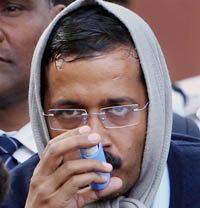
Low donations in comparison to biggies like Congress and BJP, has desisted the fledgling outfit to approach people through traditional methods like posters, advertisements on TV, radio or print media in a big way.
The Arvind Kejriwal-led party is aspiring to emerge as the third alternative in the Narendra Modi-ruled state.
“We are Aam Aadmi having less funds. We will launch our political campaign in very low profile manner in form of street plays from next week,” said AAP’s state convener Sukhdev Patel.
“Like other big parties, we can not afford to advertise through electronic or print media as we can not bear the high expenses,” he said.
“Apart from the traditional forms like door-to-door campaign the party will also hold Nukkad charchas, Mohalla Sabhas and an internship programme for youths,” Mr. Patel said.
The party claims to have planned a low profile campaign to maintain proximity with the common man.
“In Delhi election campaign, we launched an internship programme for students which met with great success. We will follow that model here in Gujarat,” party spokesperson Harshil Nayak said.
“We have launched the same programme here and some students have responded. We will also give them a small reward in form of an appreciation certificate,” he further said. “They help us as per their abilities in various sectors. Likewise we will rope in boys who are good in accounts so they will help the party in maintaining accounts. We have also found some young software engineers... they will help the party in maintaining the website,” he explained.
“We will throng the streets soon by presenting creative dramas, for which a team of 15 young people has been working hard on,” Mr. Nayak said.
“This way, we can also reach out to youths who are in majority among the total population,” he added.
“Through the students internship programme we can also reach to their families in a cost effective manner, without spending a penny on TV or radio ads,” he said.
Political commentator Dinesh Shukla considered this move as an attempt to look different from the two national parties.
“They are known to take unconventional ways to maintain their unique identity,” Mr. Shukla said. “If they keep campaigning in a typical manner, they cannot make a impact in the minds of common people,” Mr. Shukla said further.
On the issue of student internship programmes, Mr. Shukla considered it as a cadre-building movement in a typical Rashtriya Swayam Sevak Sangh (RSS) way.
“This country has the largest youth population, they surely want to reach out to them... by offering internship they can mould their mind as per their party’s ideology,” he said.
“Like RSS people reach out to the families of their young sevaks, they also want to encash the political benefit on the same line,” he added.
According to a Ahmedabad-based advertisement expert, “Media scenario has changed completely, there is a lot of fragmentation in it. Opportunity to see the ads is getting low. Social media or other unconventional media are coming out as cost-effective alternatives”.
“AAP, with limited resources, is raising its decibels by using the unconventional media,” he added.






Comments
Add new comment